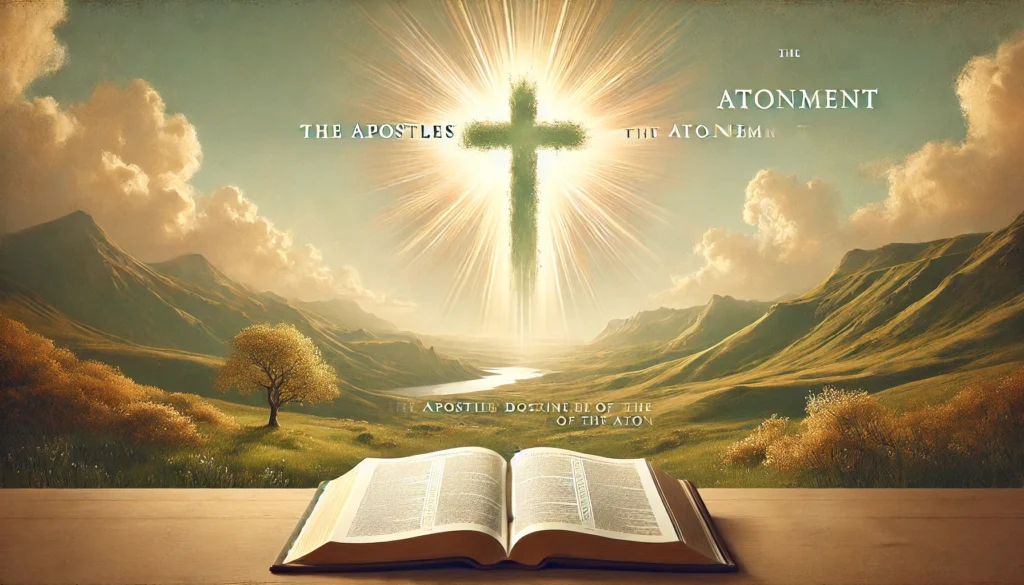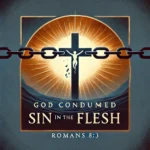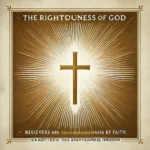Doctrine of the Atonement
Let me share something powerful about the Apostles’ Doctrine of the Atonement that changed my entire perspective on faith. When I first encountered this foundational teaching, I was struck by how relevant it remains for our modern world.

Why the Cross Matters Now More Than Ever
Walking through Cape Town’s busy streets recently, I spotted countless crosses adorning churches, necklaces, and even street art. It got me thinking about how we often see this symbol without truly understanding its deep meaning in the apostles’ teaching.
The truth is, many of us struggle to connect with ancient religious concepts. But here’s the fascinating bit – the apostles weren’t writing dusty theology. They were sharing their first-hand experiences of something that turned their world upside down.
From Eyewitnesses to Teachers
What makes the apostles’ understanding of the atonement so unique? They weren’t just passing along second-hand information. These were people who:
- Walked with Jesus daily
- Witnessed His crucifixion
- Saw Him alive after His resurrection
- Received direct teaching about what it all meant
It’s like having front-row seats to history’s most significant event and then being given the inside story of what it all meant.

Breaking Down the Big Ideas
Understanding Substitution
Here’s something that struck me during my studies – the apostles saw Jesus’ death as more than a tragic ending to a beautiful life. They understood it as a deliberate exchange.
Think of it this way. Imagine taking on someone else’s debt completely. That’s what the apostles believed happened on the cross – but on a cosmic scale. They taught that Jesus took our place, bearing consequences we couldn’t handle ourselves.
The Divine Connection
One question that often comes up in my conversations with seekers is “Why did it have to be Jesus?” The apostles had a clear answer – only someone both divine and human could bridge the gap between God and humanity.
Making It Personal
During my time working with young people in township communities, I’ve seen how this message transforms lives. One young man told me, “Understanding that someone would willingly take my place… it changed everything.”
The Gift of Right Standing
What really grabs me about the apostles’ teaching is how they described righteousness. They didn’t see it as something we achieve through hard work. Instead, they taught it as a gift – like being given a fresh start we couldn’t earn ourselves.
How This Changes Everything
The impact of understanding the atonement touches every part of life:
- It reshapes how we see ourselves
- It transforms our relationships with others
- It gives us hope when we mess up
- It provides strength for daily living
Finding Freedom in Forgiveness
One of the most beautiful aspects of this teaching is its power to free us from guilt and shame. I’ve sat with people carrying heavy burdens of past mistakes, watching their faces light up when they grasp this truth.
Practical Applications for Today
Let’s get practical about how this ancient teaching makes a difference in our daily lives:
Dealing with Failure
- Understanding forgiveness is already secured
- Learning to forgive ourselves
- Moving forward with confidence
Building Relationships
- Extending grace to others
- Finding strength to reconcile
- Creating space for healing
Living in Light of the Cross
The apostles’ teaching wasn’t meant to stay in textbooks. It’s about real life, real challenges, and real transformation. I’ve found these principles particularly helpful:
- Start each day remembering you’re accepted
- Face challenges knowing you’re not alone
- Extend to others the grace you’ve received
Questions People Often Ask
Through years of discussions about the atonement, certain questions keep coming up:
What About Other Religions?
While respecting all faith traditions, the apostles were clear about the uniqueness of Christ’s sacrifice. They saw it as the fulfilment of everything religion had been pointing toward.
Is This Just Ancient History?
The beauty of the apostles’ doctrine is how it speaks to contemporary issues. Whether dealing with personal guilt, social justice, or environmental care, this teaching provides a framework for engaging with modern challenges.
Looking Forward
The apostles’ doctrine of the atonement isn’t just about looking back at a historical event. It’s about living forward with purpose and hope. In my experience, understanding this teaching:
- Provides clarity in confusion
- Offers hope in difficulty
- Creates community across divides
- Empowers positive change
Making It Your Own
Everyone’s journey with understanding the atonement is different. Some grasp it quickly; others take time to process its implications. Both are perfectly fine.
Bringing It All Together
I’ve found that the apostles’ doctrine of the atonement becomes clearer when we:
- Study the original teachings
- Reflect on personal experience
- Share insights with others
- Apply truths to daily life
The Journey Continues
Understanding the Apostles’ Doctrine of the Atonement isn’t a one-time event – it’s a journey of discovery. Each day brings new insights into this profound truth that continues to transform lives worldwide.
Remember, this isn’t just about understanding ancient doctrine. It’s about discovering how the Apostles’ Doctrine of the Atonement speaks hope, healing, and purpose into our lives today.
FAQ: The Atonement of Christ
What was the sole purpose of Christ’s incarnation, according to the apostles?

The apostles unequivocally state that the incarnation of Christ was solely for the redemption of lost humanity. They present no other rationale for this momentous event. Texts like Galatians 4:4, Hebrews 2:14, 1 John 3:8, and 1 Timothy 1:15 explicitly link Christ’s coming to the expiation of sin and the restoration of fallen mankind. Ascribing any other intention to the incarnation contradicts the clear apostolic testimony.
How does the Old Testament foreshadow the atonement of Christ?

The Old Testament, particularly the prophetic psalms, contains direct predictions and typological foreshadowings of Christ’s atoning work. For instance, Psalm 40, quoted in Hebrews 10:5-7, portrays the Messiah declaring that God desires not animal sacrifices but a body prepared for Him to fulfill His will. This passage, interpreted through the lens of apostolic authority, points to Christ’s sacrifice as the true and ultimate fulfillment of the sacrificial system.
What is the significance of Christ being described as the “Servant of the Lord” in Isaiah 53?

Isaiah 53 paints a poignant picture of Christ as the “Servant of the Lord,” highlighting both His divine acceptance and human rejection. The imagery of a tender plant growing from dry ground (verse 2) symbolizes Christ’s sinless life flourishing amidst the barrenness of fallen humanity, while God looks upon Him with delight. Verse 9 emphasizes His spotless purity, stating that He committed no sin nor was deceit found in His words. This sinlessness is crucial for understanding His atoning work.
What does it mean that God “condemned sin in the flesh” (Romans 8:3)?

This statement, often misunderstood, underscores the judicial nature of Christ’s sacrifice. By sending His Son in the likeness of sinful flesh, God condemned sin in Christ’s flesh. This condemnation refers to the judgment and punishment of sin poured out upon Christ as the sinless substitute. This act broke sin’s dominion, freeing believers from condemnation. The law, weakened by the flesh, could not achieve this, but Christ, through His sacrifice, fulfilled the righteousness of the law for us.
How is the righteousness of God related to the atonement?

The righteousness of God, a central theme in Paul’s writings, signifies the perfect obedience of Christ, fulfilling God’s law on behalf of humanity. It is not God’s attribute of justice but a righteousness provided by God and received by faith. Christ’s sacrifice, both in His life and death, satisfied the demands of the law, enabling believers to be credited with His righteousness.
What is the meaning of redemption in the context of Christ’s sacrifice?

Redemption, in its primary sense, denotes deliverance from captivity through the payment of a ransom. In the context of Christ’s sacrifice, it signifies His atoning death as the price paid to liberate sinners from the bondage of sin and its consequences. This ransom was paid to God’s justice, not to Satan, satisfying the divine demand for righteousness.
How is the forgiveness of sins related to the atonement?

Forgiveness, in its biblical sense, signifies the remission of deserved punishment for sin. Christ’s atoning sacrifice is the basis for this forgiveness. His perfect obedience and death satisfied God’s justice, allowing for the pardon of those who believe in Him. Confession of sin, as stated in 1 John 1:9, is essential for experiencing the forgiveness procured by Christ.
What is the historical development of the understanding of the atonement?

Early church fathers focused on Christ’s victory over Satan and death as the primary effect of the atonement, while Anselm in the Middle Ages shifted the emphasis to sin’s offense against God’s honor, requiring satisfaction. The Reformers, particularly Luther and Calvin, emphasized the imputation of Christ’s righteousness to believers. While there have been various interpretations, the core truth of Christ’s substitutionary sacrifice for the forgiveness of sins has remained central to Christian theology throughout history.

